 Back
Back
 Back Back |
Home > Advisor View > Reports > Dynamic and PDF Reports > Dynamic Reports > Use the Find Data For List
|
Use the Find Data For List
|
|
The Find Data For list is your gateway to accessing data in Advisor View. It appears at the top of report pages, the document vault, the advisor dashboard, and on the client portal, and you use it to set what account, group, Household, or account is displayed on the page.
Not all entities are available for display on all reports or pages. The entities available for selection and the tabs displayed in the Find Data For list vary depending on the page.
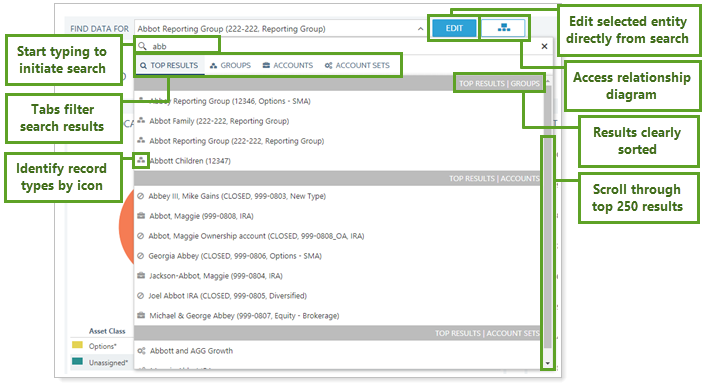
When you click in the Find Data For list, you will see either your 250 most recently viewed results or top results for your search, all organized in a way that makes it easy to find what you're looking for. Filtered tabs allow you to find the result you're looking for faster.
On the document vault, you will see the Find Documents For list, which behaves identically to the Find Data For list. The Find Documents For list searches only clients and Households. For more information, see Use the Find Documents For List.
Since you can see a mix of different record types in the Find Data For list, you will see icons next to each record type to help you identify all the different records at a glance.
The following icons are used:
| Icon | Record Type |
|---|---|
|
|
Financial account |
|
|
Group |
|
|
Account set |
|
|
Household |
|
|
Closed financial account or group |
To facilitate finding records you've used lately, when you click in the Find Data For list, you see your 250 most recent records in order of most to least recent. This includes accounts, groups, account sets, and, only for the Net Worth report and Financial Plan Summary report, Households.
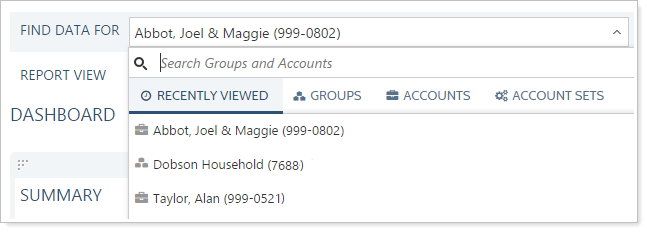
To see recently viewed accounts, click in the Find Data For list but do not enter a search term. In the Recently Viewed tab, you will see a list of all the accounts, groups, and account sets or Households that have been viewed recently. All the types of records are mixed together in the Recently Viewed tab because they are sorted by when they were last viewed, not by type.
To narrow your search results:
Use the right/left arrow keys to navigate to the desired tab.
Use the up/down arrow keys to navigate to the record and press Enter to select it.
To filter your list further, see Narrow Results with Tabs.
When you want to find a specific record, you can use the Find Data For list to search all accounts, groups, account sets, and Households. The top 15 results are displayed on the Top Results tab, with additional results listed under each tab.
Households only appear for the Net Worth report and Financial Plan Summary report.
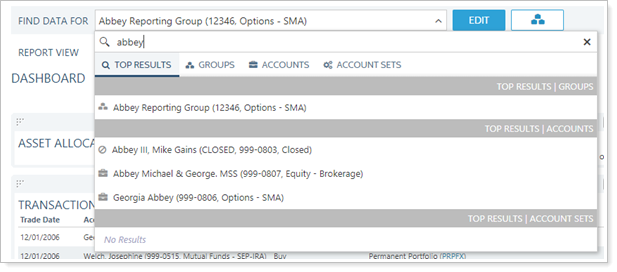
To search, click on the Find Data For list and start typing the search term. The results appear in real time, and are sorted by type within the Top Results tab.
Let's say you've just searched for an account and reviewed the results on your advisor dashboard. Now you want to see review other accounts or groups belonging to that same client.
To quickly locate those accounts, groups, and even Households, use the Related tab. This tab appears when you already have a search result displayed in the Find Data For list, and it shows:
The top 50 related Households
The top 50 related groups
The top 100 related accounts

Sometimes the Related tab shows entities that aren't meaningful for a specific page or report. In this situation, you can click the arrow  to open the corresponding page with the specific record displayed.
to open the corresponding page with the specific record displayed.
For example, if you're on the advisor dashboard, the Related tab still shows Households, even though the dashboard doesn't display based on Households. Click  next to a related Household to open the Households page, filtered to display only that Household.
next to a related Household to open the Households page, filtered to display only that Household.
Users will only see accounts, groups, and Households they have permission to see based on their user permissions.
Records are included as "related" if they are directly or implicitly linked to the record you're viewing.
Households: See accounts and groups that are direct or implicit members as shown on the Direct Members panel.
Groups: See the accounts listed on the group's All Members panel; see Households and groups listed on the Household and Group Membership panel.
Accounts: See other accounts that are members of groups that the account belongs to; see Households and groups listed under the group's Households and Group Membership panel.
The relationship diagram can help illustrate why you see the results displayed. For more information about the relationship diagram, see Using the Relationship Diagram.
Let's look at some examples to help visualize this.
The Abbey Household contains the Abbey Household Group. The Abbey Household Group contains accounts for Georgia Abbey, Michael Abbey, and Georgia & Michael Abbey.
When the Find Data For list displays data for Georgia Abbey, the Related tab displays:
| Entity Type | Entities Displayed |
|---|---|
| Households | Abbey Household |
| Groups | Abbey Household Group |
| Accounts | Michael Abbey, Georgia & Michael Abbey |
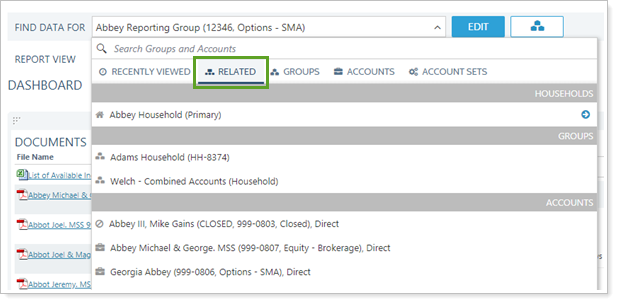
These entities are displayed because they are all related to the Georgia Abbey account, as illustrated below:
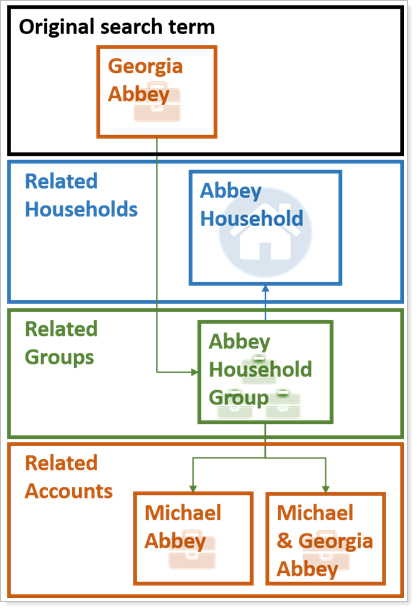
The Abbot Household contains the Abbot Children group. The Abbot Children group contains accounts for Joel & Maggie Abbot, Joel Abbot, and Maggie Abbot.
The Baker Household contains the Baker Children Trust group and the Abbot Children group, as well as an account for Christopher Baker. The Baker Children Trust group contains accounts for Ellie Baker and Sophia Baker.
When the Find Data For list displays data for Joel & Maggie Abbot, the Related tab displays:
| Entity Type | Entities Displayed |
|---|---|
| Households | Abbot Household, Baker Household |
| Groups | Abbot Children |
| Accounts | Joel Abbot, Maggie Abbot, Ellie Baker, Sophia Baker, and Christopher Baker |

These entities are displayed because they are all related to the Joel & Maggie Abbot account, as illustrated below:

Notice that the Baker Children Trust group is not included on the Related tab. That's because the Joel & Maggie Abbot account is not directly or implicitly related to it. However, all the accounts within the Baker Household are displayed because they and the Abbot Children group are both members of the Baker Household.
You can use the tabs to filter results within a specific record type, such as groups or accounts.

To narrow your search results:
Use the right/left arrow keys to navigate to the desired tab.
Use the up/down arrow keys to navigate to the record and press Enter to select it.
The following tabs are available:
| Tab | Results |
|---|---|
| Recently Viewed/Top Results |
Recently Viewed: When you click in the search list but don't enter any search terms, you see a list of the top 250 most recently viewed records, including accounts, groups, and account sets or Households, sorted most recent to least recent. Top Results: When you type in search terms, you see a list of results matching your search, sorted by type. Each section displays the top 15 search results, with additional results displayed under each tab. |
| Groups, Accounts, Account Sets |
No Search: When you click in the search list but don't enter any search terms, you see a list of the most recently viewed groups, accounts, or account sets, depending on which tab you're looking at. Search: When you type in search terms, you see a list of results matching your search in each category. The results include only groups, accounts, or account sets, depending on which tab you're looking at. |
| Households |
The Households tab appears on the Net Worth and Financial Plan Summary dynamic report pages, replacing the Account Sets tab.
No Search: When you click in the search list but don't enter any search terms, you will see a list of the most recently viewed Households. Search: When you type in search terms, you will see a list of results matching your search. The search includes only Households. |
Tabs and searches are sticky. This means that if you close the Find Data For list while looking at the Groups tab or partway through doing a search, when you open the list again, you will see the same tab or search.
When you're viewing a report, you might notice that you need to add or remove an account from a group. In the past, this meant you had to leave the report page, navigate to the Accounts page, make the change, and then go back to the report to see the change.
Now you can open and edit a record directly from a report page using the Find Data For Edit button while remaining on the report page you're viewing.

To edit straight from the Find Data For list:
In the Find Data For list, search for the record.
Click on the record.
Click Edit. Whatever record is listed as active in the Find Data For list will open.
On Reports pages, you will see the Report View list beneath the Find Data For list.

You can use the Report View list to:
Select which custom view you are using
Edit a custom view
Create a new custom view
Delete a custom view
For more details, see Dynamic Report Views.